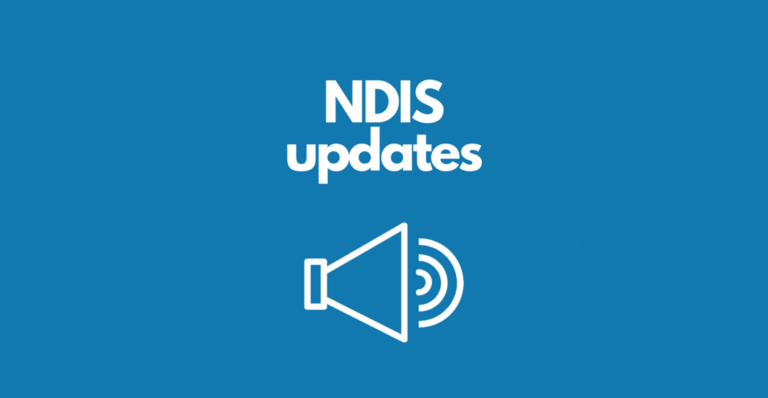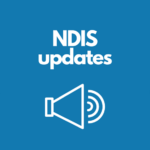Below, we have explained what each change means and how it may affect you.
Read the full article here: Understanding the price guide
What has changed in the NDIS price guide?
The NDIA has made some temporary changes to ensure supports can continue to be delivered to participants during this time, including:
- NEW low cost assistive technology (AT) arrangements because many face to face services are being suspended, and capacity building supports and interpreting services are now being delivered online
- NEW assistive technology (AT) rental ability to meet your immediate needs when leaving hospital
- NEW supported independent living (SIL) arrangements if you are diagnosed with coronavirus (COVID-19)
- introducing three new support coordination items under Core Supports to support plan flexibility
- a temporary 10 per cent increase to the price limit of some Core and Capacity Building supports
- changes to the cancellation rules.
How does it affect me?
NEW low cost assistive technology (AT)
You can use existing NDIS funds to buy low cost AT such as fitness equipment and smart devices, when:
- you have discussed with your provider the most appropriate low cost AT to meet your needs;
- the item will be used as part of your funded NDIS supports like a program, therapy or requirement (for example physiotherapy or Auslan interpreting provided via video conferencing);
- the provider has confirmed in writing that the item is necessary for your supports and services during current physical distancing requirements;
- you provide documents to the NDIS confirming items are necessary;
- it is the lowest specification that will maintain funded supports;
- you do not already have the item, another suitable item or access to the item;
- the item has not been funded by another service system (such as education or employment); and
- the item or circumstance is not excluded (such as devices for entertainment).
Participants should not spend more than $750 on a smart device.
NEW assistive technology rental when leaving hospital
If you are leaving hospital, you can immediately access the assistive technology you need to be safe at home or your first destination.
This applies for the first 30 days until your short, medium and long term assistive technology and home modification needs can be assessed and you have an updated plan in place.
NEW supported independent living (SIL) items if you are diagnosed with coronavirus (COVID-19)
If you are funded for supported independent living (SIL) and have been diagnosed with coronavirus (COVID-19), providers can claim additional costs to manage your care and support when you:
- continue to reside in the your normal SIL accommodation
- are admitted to hospital
- are relocated to alternative housing for isolation purposes or while transitioning into or out of hospital.
This covers:
- $300 for a one-off professional deep clean of your SIL residence
- additional support of $1,200 a day, from the date your infection is confirmed until you are no longer infectious (usually up to 14 days). This is on top of the cost of your usual SIL supports and includes increased costs for staffing, equipment, laundering and more.
Three new support coordination items to support plan flexibility
Three new support coordination items were introduced under Core Supports, Assistance with Daily Life. The new item numbers allow you to use your funds more flexibly to access these supports from either your Core or Capacity Building budgets.
Temporary increase to price limits
The NDIA has temporarily increased price limits by 10 per cent for some critical supports in recognition of additional costs to providers at this time. Participant plans are being automatically extended to ensure you continue to have access to funding.
Cancellations
From 25 March 2020, participants will be required to give 10 business days’ notice (up from two days) for a cancellation if they want to avoid paying the full fee for a cancelled service. Refer to the NDIS Price Guide for more information.
From 30 March, participants will be charged 100 per cent of the agreed support price if they cancel a service at short notice (up from 90 per cent).
More information on cancellations is available below.
Impact on your plan
The NDIA has made changes to make sure you have the funding you need to meet essential needs during the coronavirus (COVID-19) pandemic.
This includes taking a flexible approach to amending plans and, where necessary, shifting capacity building funding to core supports funding.
If we have been unable to undertake a plan review, on the day your current plan ends, it will be automatically extended by 365 days to make sure you have the funding you need.
For supports not included in a plan, special teams of planners are available to help make urgent changes to plans. Participants can phone 1800 800 110 for urgent assistance.
For more information on any of the above items, refer to the coronavirus (COVID-19) FAQs for participants.
Participant transport
What has changed?
From March 2020, you can use your plan’s support funding to pay registered providers transport costs when they are transporting you to and from a number of community activities funded in your NDIS plan including employment and higher education.
While these are not price controlled, the NDIS Price Guide outlines reasonable levels of costs that providers can claim for. These include:
- up to $0.85 a kilometre for a vehicle that is not modified for accessibility
- up to $2.40 a kilometre for a vehicle that is modified for accessibility or a bus
- other forms of transport or associated costs up to the full amount, such as road tolls, parking, public transport fares
This does not allow for payment of fines or other similar costs.
How does it affect me?
You can now use your budget flexibly to pay registered providers for their transport costs when they are transporting you to and from a number of community activities, and selected capacity building activities where they are funded in your plan.
Providers can claim these costs through the myplace provider portal.
This means you can continue to access your community-based supports, employment supports and higher education supports because registered providers can claim transport costs.
Your provider should discuss with you and explain any transport costs such as reasonable vehicle running costs or other associated costs before you are charged and before service bookings are updated.
If you have chosen to receive a periodic payment for transport, then that payment continues.
If you are concerned that you don’t have enough funds in your plan to cover transport costs, you may request a plan review.
Remote locations
What has changed?
To help increase the services available in remote and very remote locations, providers can charge a higher rate when delivering services in certain locations.
- The remote location rate loading increased from 20 to 40 per cent.
- The very remote location rate loading increased from 25 to 50 per cent.
- Before providers can apply the remote and very remote loading to prices they charge, they must inform you and confirm your acceptance of the new price.
- Some towns have been added to the list of locations that can charge the remote price limit.
How does it affect me?
- Your provider will contact you if they propose to claim the additional remote loading.
- Some plans for participants living in the new list of remote locations have not yet had their funds increased to include the remote loadings.
- If your plan is affected, the NDIA will contact you to arrange a plan review, including booking an appointment. This will ensure you have the correct amount of funding to pay for the supports you need.
- If you live in a remote location, make sure your address details are correct in the myplace participant portal so that your plan funding includes the remote loading.
Introduction of Medium Term Accommodation
What has changed?
The NDIA has introduced a new support item Medium Term Accommodation (MTA). MTA is for NDIS participants who need transitional accommodation while they wait to move into their confirmed permanent home (for example at hospital discharge).
MTA consists of the accommodation component of care only which is then supported by the participant’s existing living costs and disability support arrangements.
Providing NDIS participants with access to medium term transitional housing aims to reduce the number of young people in aged care, minimise delays in hospital discharges and support participants transitioning from custodial settings into the community.
Providing NDIS participants with access to medium term transitional housing aims to reduce the number of young people in aged care, minimise delays in hospital discharges and support participants transitioning from custodial settings into the community.
How does it affect me?
If you are an NDIS participant and are waiting to move into your permanent home, you may be able to access MTA.
For more information about your housing options, please talk with your Local Area Coordinator or planner. Alternatively you can call 1800 800 110.
Participants in MTA continue to have access to their existing daily living and capacity building supports with them (e.g., assistance with self-care, disability support worker to assist with social participation). Alternatively, they may choose to purchase these kinds of supports from their medium term accommodation provider.
Price limit increases and name change to Short Term Accommodation and Assistance
What has changed?
The NDIA has increased price limits for Short Term Accommodation and Assistance across weekdays, weekends and public holidays and from 1:1 through to 1:4 support ratios, effective 1 December 2019.
The changes better reflect sustainable cost levels for these supports. Any impact from the price limit increases is expected to be minimal as respite is an occasional care need only. Participant plans therefore will not be indexed as a result of the change.
The NDIA has introduced the word ‘respite’ into the title and description of all Short Term Accommodation and Assistance line items. This has been abbreviated to ‘STA and Assistance (incl. respite)’ in the Support Catalogue and Provider Portal.
How does it affect me?
Participants can purchase respite services as a short-term accommodation support to give family and/or carers a break from their caring responsibilities.
The NDIA recognises that it is important for family and carers to take time off to manage their own health and wellbeing. This change aims to ensure they are able to achieve this.
Non-face-to-face services
What has changed?
Your provider may charge you for non-face-to-face activities. These activities must be part of delivering a disability support item to you. One example is writing a progress report for your other support providers. These activities do not include general business activities such as scheduling staff.
How does it affect me?
- Your provider should discuss and explain the non-face-to-face activities you are charged.
- Providers can only charge for non-face-to-face activities each time they deliver a service or support.
- The charge needs to be reflective of the length of time it takes to deliver a non-face-to-face activity.
- Non-face-to-face charges should never appear as an ongoing, standardised fee billed from your provider.
Cancellation billing policy
How does it affect me?
- Cancellation charges will apply if you do not attend your service or support booking.
- If you cancel outside the timeframes, you may be charged – even if you did not receive the support.
- You should understand the service agreement you have with your provider as it may contain information on cancellations.
- You should discuss your preferred cancellation method with your provider and / or Support Coordinator. This could include notification by phone, SMS, email and/or via the myplace portal
- If you have a high number of cancellations, your provider may discuss this with you.
Provider Travel
What has changed?
- The length of time that providers can charge you for travel has increased.
- If you reside within city areas you will now be charged up to 30 minutes per booking.
- If you reside within regional areas you will now be charged up to 60 minutes per booking.
- Providers can also now charge travel for therapy assistants.
- You can only be charged this fee once per booking unless it is a capacity-building support where providers may also charge for return travel.
How does it affect me?
Your provider should make you aware of these travel charges prior to delivering your supports.
Support Coordinators: inclusion for travel, cancellations and report writing
What has changed?
From 1 July 2019, Support Coordinators can charge for travel, cancellations and report writing.
This change clears up confusion. Until now, Support Coordinators were claiming these items incorrectly or absorbing the costs.
How does it affect me?
Your Support Coordinator may have a conversation with you about charging for these services when these services are required as part of delivering your supports.
Disability-related health supports
What has changed?
From 1 October 2019, additional disability-related health supports will be available to purchase using NDIS funding.
The need for these disability-related health supports must directly relate to an NDIS participant’s significant and permanent functional impairment, and the support need is ongoing and best provided by the NDIS.
The typical types of support available can be grouped into eight ‘support type’ categories but this is not an exhaustive list.
The NDIS will fund disability-related health supports for participants who need help to manage a range of conditions including continence, respiratory, nutrition, wound and pressure care, dysphagia, diabetes, podiatry and epilepsy.
The Commonwealth, State and Territory governments have committed to ensuring NDIS participants continue to receive disability-related health supports while the funding arrangements transfer to the NDIS. Access to disability-related health supports will not stop during the transfer.
How does it affect me?
If you already have an NDIS plan, you have two options:
- You can use your plan budget flexibly to purchase disability-related health supports (with the exception of Assistive Technology valued over $1500, this support can only be purchased once you have a plan review and funds are included in your plan).
- You can continue to receive support from your State or Territory health service and inform them you are an NDIS participant. Your health service may seek your permission to share information with the NDIA or support you to ask for a plan review. This will help you get supports included in your plan quicker, allowing you to choose the providers you want to deliver these services.
The Price Guide includes specific items for Assistive Technology and Consumables associated with disability-related health supports.
Two sets of support codes have been developed:
- One for when you have a specific disability-related health support included in your plan
- Another for when you are using your plan flexibly prior to them being included at your plan review. When you are using your funds flexibly, providers will need to make service bookings at category level and then claim for payment for these items.
New support codes have been added to the Price Guide, which outlines the price limits for disability-related health supports when delivered by a:
- Enrolled nurse
- Registered nurse
- Clinical nurse
- Nurse practitioner.
Who should I contact to discuss these changes?
If you have any questions about the changes to the Price Guide or specific policies you can:
- talk to your provider by calling us on 4222 7479 or,
- discuss your situation with LACs and Support Coordinators.
You have choice and control over how you spend your NDIS funds and which providers you choose to deliver their services.


